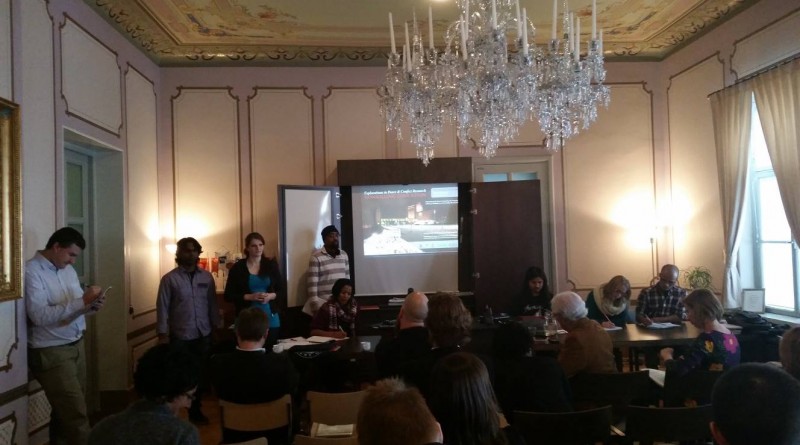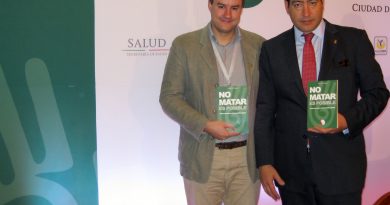CGNK Takes Vasa Statement on Education to UN
The Center for Global Nonkilling, in its capacity of non-governmental organization in special consultative status with the United Nations Economic and Social Council, submitted a formal written statement to the UN Secretary General addressing the 30th session of the Human Rights Council, that is being held in Geneva between September 14 and October 2, 2015. CGNK Director Joám Evans Pim and Geneva Main Representative Christophe Barbey will be present during the hearings.
CGNK’s written statement “Vasa Statement on Education for Killing-Free Societies” stems out of the exploratory conference that was convened on March 24-25, 2015, in the city of Vasa, Finland, gathering sixty participants from twenty countries to focus on the role and potential of education in bringing about a killing-free world. The statement contains a set of recommendations drafted by the graduate students of the course on Nonkilling Studies at Åbo Akademi University’s Program in Peace, Mediation and Conflict Research, incorporating notes from the conference and participant’s feedback. References providing additional information for each item can be found in the full PDF version. The English, French, and Spanish versions of the statement can be downloaded here or from the official UN documentation site under reference number A/HRC/30/NGO/15.
Vasa Statement on Education for Killing-Free Societies
- Need to refocus child-rearing practices in ages up to six with an understanding of its importance for bringing up healthy nonviolent individuals because of vast immaturity at birth and biosocial co-construction of brain functions postnatally (see evidence on importance of prolonged breast-feeding, cuddling, extensive alloparenting, appropriate social models, extensive play in natural world, etc.). This requires providing support for parents prenatally and postnatally in ways that will allow them to be maximally responsive to their children. Similar appropriate educational practices should be provided throughout childhood and into adolescence.
- Small schools embedded within small communities with an active teachers-families collaboration is the most appropriate educational environment for building killing-free communities. Where applicable, diversity in school and community (e.g., ethnic, sexual, linguistic, …) should not be seen as a problem but as a resource and opportunity for cooperative learning finding ways to reduce prejudice/bias/stereotyping/discrimination and to increase our responsibility toward the well-being of all community members.
- Teacher education and training programs need to consider nonkilling/nonviolence education as an integral component of teacher training. This can be achieved by providing future teachers training in: social emotional learning; counseling skills and dialogue (including active listening, reflection, effective questioning skills); and conflict prevention strategies and positive ways of resolving conflict. The integration of subject matter and moral and democratic issues (the so-called double assignment) should become an integral part of teacher education and teaching practice, approaching content matter holistically, with nonkilling constituting a natural, inherent component.
- There is a need to shift from education and play that foster competition and individualistc behaviors to approaches that are oriented toward cooperative and experiential learning that enable social-emotional competencies and active critical thinking.
- In working with children and youth, adults need to move away from models that focus solely on extrinsic motivation (e.g., use of punishment and/or rewards that are mainly intended to reinforce obedience and conformance) to models that are founded in our basic human needs for belonging, autonomy, participation, creativity, recognition and competence. Such models require a shift toward an ethic of care, compassion and kindness and the use of restorative practices/restitution and peaceful problem transformation, in which individuals have an active role in constructing their own meaning from experience taking a lifespan perspective, encouraging adults to take care of their own social, emotional, and moral capacities. Also, the value of negative moral knowledge (learning from own and others’ moral mistakes) needs to be stressed as it is a powerful source of moral learning and constitutes a basis for reconciliation, restitution, and forgiveness.
- There is a need to minimize violent social models, especially in the media and entertainment, countering them with the inclusion of nonviolence and conflict prevention/management as overarching social competences.
- There is a need to include nonhumans in the nonkilling circle of concern. This requires adopting a humbler view of humanity, as one of many earth creatures. When humans feel superior it fuels mistreatment not only of humans but of all nonhumans (animals, plants, mountains, rivers, etc). Children’s lives and education should take place within natural world settings as much as possible, drawing their respectful attention to the ecological landscape around them.
- Although the above-mentioned educational and teacher-training goals are currently at reach in many settings, for their global implementation a shift of resources from military and security spending to life-sustaining activities, including education, health-care and agriculture, must be considered.




